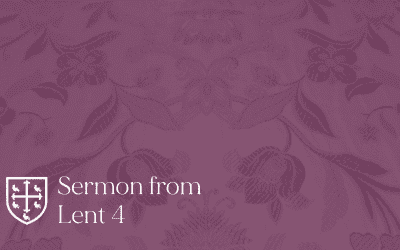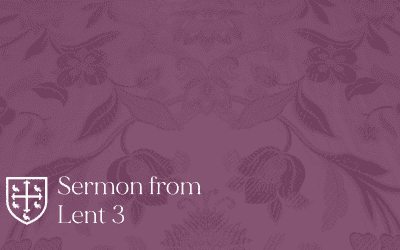C.S. Lewis wrote, “Hope is one of the Theological virtues. This means that a continual looking forward to the eternal world is not (as some modern people think) a form of escapism or wishful thinking, but one of the things a Christian is meant to do. It does not mean that we are to leave the present world as it is. If you read history you will find that the Christians who did most for the present world were just those who thought most of the next.”
So here we are in the first week of Advent, the church season when we spend time anticipating the coming of Christ, Emmanuel, God With Us. We’re not only remembering the coming birth of Jesus, but we also look forward to His return and when all things will be made right.
Anticipation… just like children waking up on Christmas morning anticipating the magic of Christmas and immersing themselves in the gifts they’re getting.
Even right now, weeks ahead of time, children everywhere can’t wait for that morning to come. It’s a day filled with so much promise and joy.
And that’s what we call hope, “a feeling of expectation and desire for a certain thing to happen.”
Our reading from Jeremiah today is about hope. But in order to fully appreciate it, I want to set it up a little more by exploring the context for our passage.
a short introduction to jeremiah
Much of the book was written in the years leading up to, and the text tells us, into the fifth month of the captivity in Babylon. It starts off with Jeremiah’s account of his call and commission from the Lord. In that, he writes,
“Then the Lord put out his hand and touched my mouth; and the Lord said to me, “Now I have put my words in your mouth. See, today I appoint you over nations and over kingdoms, to pluck up and pull down, to destroy and to overthrow, to build and to plant.” (1:9-10)
Jeremiah had some heavy messages to deliver. The first nearly 30 chapters have to do with calling out God’s people for their sinful ways.
It’s so bad that in chapter 7, he calls out the Israelites for worshipping God in the Temple, and then turning around in the streets to worship other gods and offering unspeakable sacrifices.
And the worst part is that through all of Jeremiah’s warnings that something really bad will happen if they don’t change their ways, it all fell on deaf ears. Nobody wanted to hear how their self-gratifying way of life would result in anything bad.
So he suffered through great rejection and threats on his life.
It’s no wonder he’s called “the weeping prophet.”
And then it happens. The very thing that Jeremiah warned the people would happen, happened. The mighty Babylon swoops in, takes Jerusalem, and displaces all of the people. It’s the beginning of the Babylonian Captivity.
Then in chapter 29, we see a shift in Jeremiah’s message. Starting in verse 10 we see…
“For thus says the Lord; Only when Babylon’s seventy years are completed will I visit you, and I will fulfill to you my promise and bring you back to this place. For surely I know the plans I have for you, says the Lord, plans for your welfare and not for harm, to give you a future with hope.”
There’s that word… hope.
It’s also worth noting here that this passage, which was given to the people of Israel in the beginning of the captivity, was a promise that would be fulfilled 70 years in the future. The people who were receiving this promise would never live to see its fulfillment. But their kids and grandkids would see it.
I think there’s something that could be said about realizing how our thinking should focus on things bigger than ourselves. But that’s another sermon…
From here, chapters 30-33, a sort of centerpiece of the book, has Jeremiah speaking of the coming hope, culminating with the promise in our reading today from chapter 33 for the coming of a righteous king from the line of David.
As you follow through all of this, one thing that becomes very clear in what God is doing…
Sin will not get the final word!
No matter where we are or what we’ve done, God wins. And He relentlessly pursues His people… us.
thoughts on jeremiah 33:14-16
Now that we’ve set that up, let’s start looking at our passage. Chapter 33 starts off with a beautiful promise of the recovery and healing that the Lord is bringing.
Then we get to verse 14 (from our reading today), which starts with…
“The days are surely coming, says the Lord, when I will fulfill the promise I made…”
If the Bible has shown us anything, it’s that we can count on God to keep His promises. Over and over again, we see the Lord making and fulfilling His promises to the people.
It’s all on Him, and not dependent on our actions.
Think about that for a moment…
If our salvation were up to us, then we’d never be able to achieve it. But God does it for us.
Here we see the Israelite people who messed things up pretty badly and completely spit in the face of the Lord, and God’s like…
“Okay, you’re living the consequences of your actions. But listen… I’ve got your back. You messed up, but I’m going to make this right. You can count on me to take care of it.”
The text continues…
“In those days and at that time I will cause a righteous Branch to spring up for David…”
This is a direct reference to the coming Messiah.
“…and he shall execute justice and righteousness in the land.”
That word justice is an interesting one. It’s a big word that a lot of people have different ideas about what it means. We talk about it in youth group pretty regularly.
Typically, our culture today defines it largely as a punishment for someone who broke the law. Someone robbed a store at gunpoint and shot at an innocent bystander… they must pay! There must be justice!
Hopefully justice is fulfilled if they get a hash-enough sentence for their crimes.
But when you dive into what justice really means, it goes a lot deeper. It’s not about punishment as much as it’s about making right the wrongs.
And in that sense, you can apply the term to so many more wrongs in our society. You start to see application with things like caring for the widow, the orphan, the sick, the poor, and so many other difficult situations.
So when the Lord says that He’s coming to execute justice and righteousness in the land, it’s not about punishing bad people.
It’s about bringing hope to the suffering.
The text continues…
“In those days Judah will be saved and Jerusalem will live in safety. And this is the name by which it will be called: “The Lord is our righteousness.””
The place that the people of God call home will be called, “The Lord is our righteousness.”
(awkward pause)
how does this apply to us today?
And that brings us to today. Christ’s Church here right now, starting another journey through Advent.
And we live in a broken world. It might not look and feel exactly like it did for the people living in the Babylonian Captivity 2600 years ago.
But it’s not a stretch for us to look at the world we live in and feel like something’s off; like we’re displaced from the way things should be.
Practically, every day I have a conversation that ultimately lands on, “That’s just not right,” or “Wow, that’s crazy!” We feel it when we share our life experiences with each other or talk about current events.
As we begin this journey into Advent, reflect on where you’re at…
- Maybe you’re living in the struggle of the consequences of your own sin
- Maybe you feel like you’re living a displaced life in exile from where you belong
- Maybe you’re struggling on the inside with the weight of this life
- Maybe you look around and don’t like the suffering you see in others… those close to you, or around in our community
You need to know that He is coming.
You need to know that there is a hope and a future when all of the wrongs of this life are made right. And that we will live in a place called, “The Lord is our righteousness.”
Our Book of Common Prayer addresses the topic of the Christian hope in the Catechism (The Outline of the Faith, on page 861). Here’s what it says…
What is the Christian hope?
The Christian hope is to live with confidence in newness and fullness of life, and to await the coming of Christ in glory, and the completion of God’s purpose for the world.
It continues…
By the coming of Christ in glory, we mean that Christ will come, not in weakness but in power, and will make all things new.
This echoes Our reading from Jeremiah today. We can have confidence that Christ is coming for us.
And not like…
(said fearfully) “Christ is coming for you!”
But more like…
(said hopefully) “Christ is coming for you!”
The Catechism finishes with this statement that also echoes what we see God doing through all of this stuff we’re exploring in Jeremiah…
Our assurance as Christians is that nothing, not even death, shall separate us from the love of God which is in Christ Jesus our Lord. Amen.
With this perspective on hope, it’s easy to see how C.S. Lewis can make the statement, “that the Christians who did most for the present world were just those who thought most of the next.”
Hope changes everything.
final thoughts
As we move through this season of prayer and reflection, anticipating the coming of the Messiah, not only in His birth that we remember and celebrate, but also in His return when He will execute justice and righteousness in the land, when He comes to make all things new…
May we keep our focus in the right place, and never lose hope.
As our Lord has said, “The days are surely coming.”



